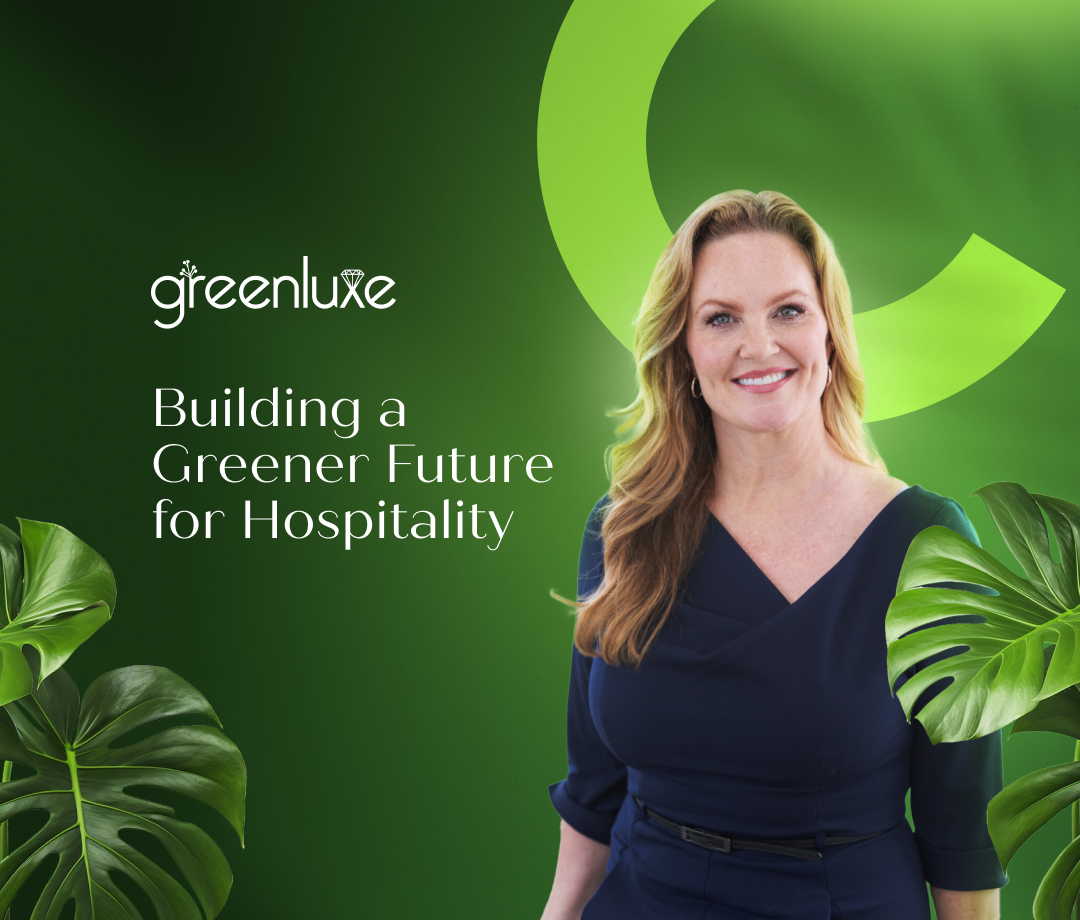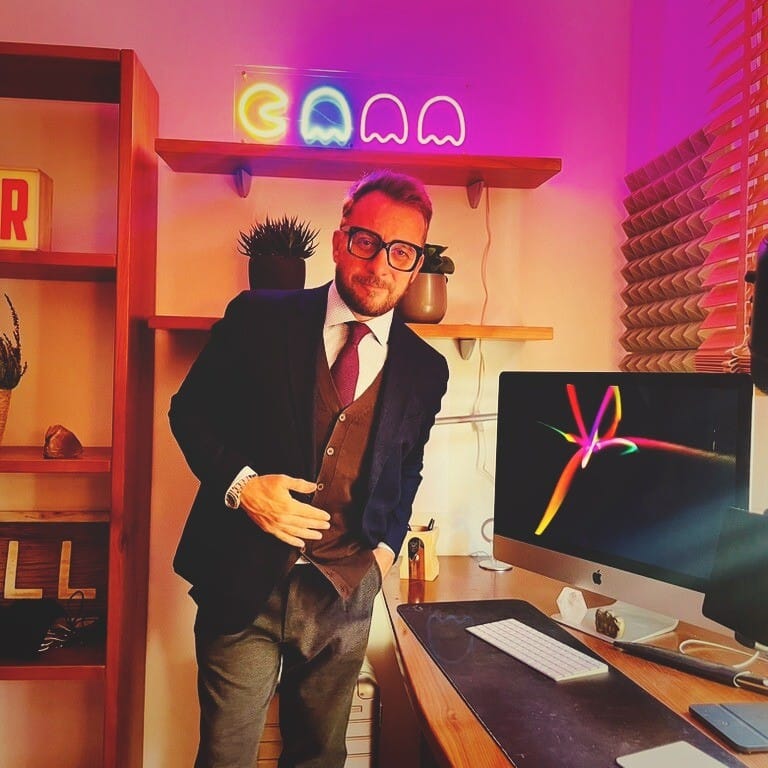Interesting Journeys Into Hospitality: Amy Wald
In this episode of interesting journeys, we talk about sustainability with Amy Wald, the founder of Greenluxe and host of the Sustainable Hospitality Podcast.

Welcome to the first article of our series covering interesting journeys into the hotel industry. In this episode, we interview impressive people about their interesting journeys into the hotel industry. In this episode, we talk about sustainability with Amy Wald, the founder of Greenluxe.
Amy is a leading expert in Sustainable Hospitality. She holds degrees in Sustainable Business and Wildlife Management and multiple sustainability accreditations, such as GSTC, LEED, WELL, and ISSP. She leverages her expertise to help hotels implement customized sustainability strategies to help them reach their sustainability goals, increase visibility, and differentiate themselves.
Her ability to connect, motivate, and educate through her Sustainable Hospitality Podcast is a big part of her success, lets find out about her interesting journey!
Bule: Tell us about your journey, Amy.
What were you doing before you entered the world of hotels and sustainability?
Amy: I’ve always had a passion for the environment and animals, but my career initially took me in a different direction. Like many people, my path wasn’t straightforward. I spent many years working in sales and marketing across various industries, which gave me a broad perspective on different business models. Eventually, I found myself on the supply side of hospitality in Miami, collaborating with food and beverage managers in a number of beautiful hotels.
But the most transformative experience for me was taking a job on a cruise ship. It was such a significant change—leaving my animals for six months at a time was incredibly difficult. However, looking back, it was one of my best decisions. During this time, I began to notice the enormous amount of waste and the lack of regard for local communities at the ports of call. These experiences made me realize there was a huge problem that needed to be addressed.
Bule: What drove you to study sustainability?
Amy: While on the cruise ships, I was constantly observing. I saw a tremendous amount of waste and noticed how the influx of tourists often didn’t benefit the local communities. There was a disconnect between the industry’s practices and my personal values as an environmentalist. After about three and a half years, I decided it was time to make a change. I returned to Columbus, Ohio, which I never thought I’d do, and pursued a business degree in sustainability and wildlife. I knew I wanted to do something bigger, something that could have a lasting impact.
Bule: How did your studies influence your career direction?
Amy: I wasn’t exactly sure where my studies would lead me, but I was committed to making a difference. My husband and I began traveling extensively, conducting what I now consider market research. In 2016, 2017, and 2018, we visited some of the most innovative and sustainable hotels around the world. One of our first trips was to Tahiti, where I learned about a technology called SWAC—Seawater Air Conditioning. This method uses cold water from the ocean floor to cool hotels, and it was a revelation for me. It was at that moment I realized there were practical, impactful solutions out there.
Bule: What inspired you to turn this knowledge and passion into a business?
Amy: I knew I wanted to merge my passion for sustainability with my love for hospitality and travel. So, I started immersing myself in learning. I became LEED accredited and took various hospitality and tourism sustainability certifications. I attended numerous webinars and workshops, soaking up all the information I could. Initially, I didn’t have a clear business plan or strategy, but I was determined to make a difference.
Then, when COVID hit, it gave me time to pause and reflect. I realized that many places in Europe were ahead of the game regarding sustainability in hospitality. This motivated me even more, and I began to think about how I could apply what I learned to the hospitality industry in the United States.
Bule: What steps did you take to develop your business model?
Amy: I started by interviewing hotel managers everywhere we went, asking them about their sustainability practices, what motivated them, and the challenges they faced. This allowed me to develop a framework for implementing sustainable practices in hotels. It was about understanding both the economic drivers and the cultural aspects of each hotel. Over time, I refined this framework, which now helps hotels start their sustainability journey effectively.
Bule: How do you approach hotels who may not consider sustainability a priority?
Amy: It’s essential to understand what’s important to hotel managers and staff. Interviewing the staff can provide incredible insights because they often have the best ideas, and getting them to buy into sustainability initiatives is crucial. Understanding what guests value is also important, as this can drive loyalty and enhance the guest experience. Finally, I focus on local context. A sustainability strategy that works in the Canary Islands might not be suitable for Chicago, Illinois. It’s about creating a plan that fits each location's specific needs.
Bule: What advice would you give to hoteliers looking to make a difference?
Amy: The first step is to ensure all key stakeholders are on board with the sustainability vision. You need buy-in from everyone in the organization. Next, find someone who can lead the charge—whether it’s an internal champion or an external consultant like myself. It’s crucial to avoid greenwashing and be honest about where you are in your sustainability journey. Sustainability is not just a trend; it’s an essential part of future-proofing your business.
Bule: Who are some of the hotels doing great work in sustainability?
Amy: There are several hotels out there doing an excellent job. For instance, IHG is a big organization that has made significant strides in sustainability. One Hotels has shown that sustainability works and that customers are willing to pay for it. I also admire Soul Community Planet for their deliberate impact on the community and the message they leave with their guests. They are committed to taking care of all the different areas they operate in worldwide.
Bule: Tell us more about your business. What does it look like day-to-day?
Amy: Right now, we’re heavily involved in Green Key Global certifications. Green Key Global is a certification body created by hoteliers for hoteliers. It’s a great way for hotels to get started with sustainability, providing a low barrier to entry and a roadmap for deeper commitments moving forward. We also conduct many workshops and training sessions to help hotels understand what they need to do to make their sustainability programs successful. Additionally, we’re involved in green building retrofits, LEED certification, and helping clients obtain green financing for property improvement plans.
Bule: You also mentioned a podcast. Can you tell us more about that?
Amy: Absolutely! I’m really passionate about sharing stories and practical advice through our podcast, *The Sustainable Hospitality Podcast*. We have guests from all over the industry who are making a difference, from policy changers to boots-on-the-ground organizations. It’s a great way to learn about sustainable practices and get inspired by what others are doing.
Bule: What final message would you like to leave with hotel owners?
Amy: This is an incredible time to be in the hospitality industry. We have the power to create significant behavioral change within our organizations and beyond. Sustainability should be a collaborative effort, and we can learn from each other’s best practices. By infusing sustainability into your culture, you create a unique value proposition that will attract like-minded customers and reinvigorate your staff. It’s about running your business better, and creating a more resilient model.
If you’re doing it right, you’ll save money and attract new guests. It’s a win-win.
Bule: That was brilliant Amy, thank you so much for coming on the show!
Amy: My pleasure Guy, thank you for having me on.
This brings us to the end of our interview, but do please give Amy a follow on Linkedin, check out her website, and listen to her sustainability podcast here!


